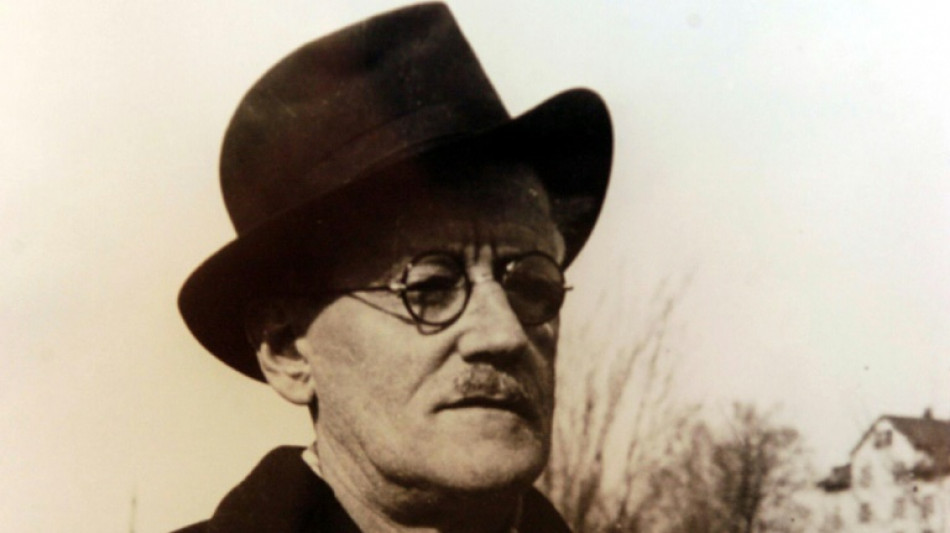
-
 Navalny lawyers face long sentences in Russian 'extremism' trial
Navalny lawyers face long sentences in Russian 'extremism' trial
-
Neuer returns but Musiala out for Bayern

-
 'Real-world harm' if Meta ends fact-checks, global network warns
'Real-world harm' if Meta ends fact-checks, global network warns
-
Auger-Aliassime belatedly beats Paul to reach Adelaide final

-
 Stock markets drift lower as US jobs data looms
Stock markets drift lower as US jobs data looms
-
Lancet study estimates Gaza death toll 40% higher than recorded

-
 South Korea's presidential security chief resigns
South Korea's presidential security chief resigns
-
Italian FM tours landmark mosque in first Syria visit

-
 'Apocalyptic': ghastly remains of Malibu come into focus
'Apocalyptic': ghastly remains of Malibu come into focus
-
Pakistan flight departs for Paris after EU ban lifted

-
 Nicolas Maduro: Venezuela's iron-fisted 'worker president'
Nicolas Maduro: Venezuela's iron-fisted 'worker president'
-
Ukraine's French-trained brigade rocked by scandal

-
 Venezuela's Maduro to take presidential oath despite domestic, global outcry
Venezuela's Maduro to take presidential oath despite domestic, global outcry
-
Red-hot Gauff vows to keep cool in Australian Open title charge

-
 Zverev says he has mindset to finally win Grand Slam in Melbourne
Zverev says he has mindset to finally win Grand Slam in Melbourne
-
Anti-war Russian theatre in Latvia fights language ban

-
 Nobel laureate Malala Yousafzai to visit native Pakistan for girls' summit
Nobel laureate Malala Yousafzai to visit native Pakistan for girls' summit
-
Shotgun watch: LA fire evacuees guard against looters

-
 Los Angeles fire deaths at 10 as National Guard called in
Los Angeles fire deaths at 10 as National Guard called in
-
'Control freak' Swiatek describes shock and 'chaos' over doping ban

-
 Vietnam jails ex-lawyer over Facebook posts
Vietnam jails ex-lawyer over Facebook posts
-
Sinner in dark over verdict as ATP says doping case 'run by the book'

-
 US President-elect Trump to be sentenced for hush money conviction
US President-elect Trump to be sentenced for hush money conviction
-
AI comes down from the cloud as chips get smarter

-
 Englishman Hall grabs share of Sony Open lead
Englishman Hall grabs share of Sony Open lead
-
Olympic champ Zheng says 'getting closer' to top-ranked Sabalenka

-
 Tajikistan bets on giant dam to solve electricity crisis
Tajikistan bets on giant dam to solve electricity crisis
-
Air tankers fight Los Angeles fires from frantic skies

-
 Right-wing disinformation targets DEI, 'liberal' policies as LA burns
Right-wing disinformation targets DEI, 'liberal' policies as LA burns
-
Osaka to play Australian Open after 'devastating' injury pullout

-
 'Disruptor' Medvedev ready to bring down Sinner and Alcaraz
'Disruptor' Medvedev ready to bring down Sinner and Alcaraz
-
Atletico can seize La Liga lead as Osasuna visit

-
 Navalny lawyers face long sentences in 'extremism' trial
Navalny lawyers face long sentences in 'extremism' trial
-
Sinner declares innocence as ATP chief says doping case 'run by the book'

-
 India's Kumbh Mela, world's largest religious gathering
India's Kumbh Mela, world's largest religious gathering
-
India readies for mammoth Hindu festival of 400 million pilgrims

-
 Uruguay bucks 2024 global warming trend
Uruguay bucks 2024 global warming trend
-
Last 2 years crossed 1.5C global warming limit: EU monitor

-
 Asian markets drift lower as US jobs data looms
Asian markets drift lower as US jobs data looms
-
Sabalenka has 'target on her back' in pursuit of Australian Open 'history'

-
 Croatia's populist president tipped for re-election
Croatia's populist president tipped for re-election
-
Veteran Monfils powers past teenager to reach 35th final

-
 Los Angeles fires rage on as National Guard called in
Los Angeles fires rage on as National Guard called in
-
Japan 'poop master' gives back to nature

-
 UN watchdog says Australia violated asylum seekers' rights
UN watchdog says Australia violated asylum seekers' rights
-
Murray braced for Djokovic ire in coaching debut at Australian Open

-
 At CES, AI-powered garbage trucks reduce battery fire risk
At CES, AI-powered garbage trucks reduce battery fire risk
-
S. Korea presidential security chief urges 'no bloodshed' in Yoon arrest

-
 Combustible Kyrgios says tennis 'a bit mundane' without him
Combustible Kyrgios says tennis 'a bit mundane' without him
-
US Supreme Court to hear TikTok ban case


Dublin celebrates 'Bloomsday' as Joyce's 'Ulysses' hits 100
One hundred years ago, a wandering Irish writer emerged from the ashes of World War I with a reworking of Greek myth that still retains the power to shock, to confound and to intrigue.
James Joyce's "Ulysses" was first published in February 1922 in Paris after printers in Britain had refused to handle the "obscene" novel.
It remained banned there and in the United States for years.
The anniversary four months ago was duly observed by Joyceans around the world.
But this week fans will don period dress to celebrate their annual commemoration of the novel with more than usual gusto.
"Ulysses" plays out entirely on one day -- June 16, 1904 -- and follows the emphatically unheroic Leopold Bloom around British-ruled Dublin, obliquely tracking the adventures of Homer's protagonist Odysseus on his epic return home from the Trojan War.
For "Bloomsday" this Thursday, performers in costumes from the turn of the 20th century -- straw boater hats and bonnets -- will re-enact scenes from the book across the Irish capital.
Sweny's Pharmacy, where Bloom buys lemon soap for his wife Molly, will become a stage for re-enactments of the book's "Lotus Eaters" scene, while a funeral procession for another character, Paddy Dignam, will be held in the city's Glasnevin Cemetery.
- 'Bit of craic' -
Events for the centenary have been held throughout Dublin this week.
On Tuesday an audience crammed into the first-floor room of a Napoleonic era fort in Sandycove, where Joyce once stayed, to watch a performance of an imagined second meeting between the Irish author and his French contemporary Marcel Proust.
Now a museum and place of pilgrimage for "Ulysses" enthusiasts as the setting for the novel's opening scene, the two titans of 20th century literature debate Joyce's legacy and sip wine -- apple juice for the matinee performance –- in the tower's living quarters.
"It's just been fantastic to get down here and immerse ourselves in a bit of craic (fun)," Tom Fitzgerald, a volunteer with the museum who played Joyce in the performance, told AFP.
"Some people take it very seriously. I always say at Sandycove we do the eating, drinking and singing part of 'Ulysses' and if Joyce was around, he'd be here. He wouldn't be at some symposium."
Irish embassies around the globe will be marking the day with events including a Zulu performance of Molly Bloom's closing soliloquy in Johannesburg and a Vietnamese rendering of Joyce's "Dubliners" collection of short stories in Hanoi.
Elsewhere, grassroots festivals organised by fans in places ranging from Toronto to Melbourne and Shanghai are also taking place.
- Incisive questions -
A totemic work of early 20th century modernist literature, "Ulysses" is densely allusive and hard to categorise.
It dismantles genres as Joyce responds in revolutionary style to Irish nationalism, religious dogma and sexual politics, among a host of other themes.
Bloom himself is Jewish, an outsider in Catholic Ireland. The novel is sometimes smutty, sometimes scatological, and sometimes impossible to decipher.
But it is often bitingly funny, and never less than thought-provoking, as Joyce answers Homer with his own modernist take on myth.
For Darina Gallagher, the director of James Joyce Centre in Dublin, "Ulysses", which was published in the same year as the Irish state was formed, raises questions that Ireland still contends with.
"We haven't really been able to talk about gender and politics, identity and nationalism. And we're still only growing up as a society to confront issues of the Catholic Church that we can't believe Joyce is writing about," she said.
"Ulysses" was written in self-imposed exile away from Dublin as Joyce spent War War I on his own odyssey around Europe, from Trieste to Zurich and Paris.
The Bloomsday tributes carry a certain irony: Ireland, then in the grip of Catholic orthodoxy, refused to repatriate Joyce's body when he died in 1941, aged only 58. He was buried in Zurich.
British dramatist Tom Stoppard in his 1974 play "Travesties" imagines Joyce meeting Lenin and Dada founder Tristan Tzara in Zurich in 1917.
"What did you do in the Great War, Mr Joyce?" a character asks the writer.
Joyce replies: "I wrote 'Ulysses'. What did you do?"
D.Moore--AMWN